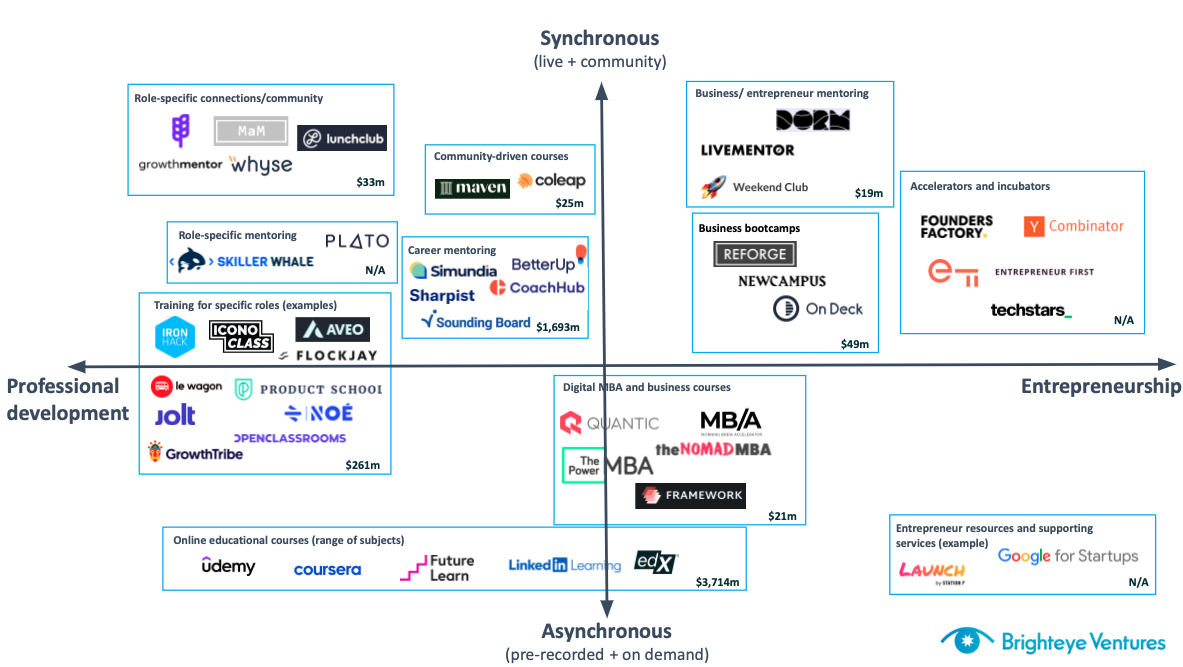Rhys Spence
Launched in 2003, LinkedIn quickly became the first global professional social media network by offering an easy way to make and track professional connections. At roughly the same time, Y Combinator (YC) and other accelerators emerged as a largely analog means for entrepreneurs willing to commit three months of time and ~6% of their company to receive en masse training and connections to mentors, peers and funders.
While both LinkedIn and Y Combinator are still going strong, a new crop of companies are looking to fill the gap between these two approaches via structured online experiences that provide a combination of training and connections to help people achieve their professional goals.
The emergence of these companies is part of a broader trend of the democratization of professional development, sparked in part by increasing awareness and recognition of the mismatch between what traditional education is delivering to young people and what’s demanded by employers. Indeed, the OECD estimated in 2019 that at least 80 million workers in Europe are mismatched in terms of their qualifications and what’s demanded in the workforce across a wide range of industries.
It’s positive, then, that the unbundling process is improving access to high-quality professional education and development. Lower prices, shorter courses and content more closely tied to professions all make it easier for people to retrain and upskill where necessary.
Gone are the days when the only way to get a fantastic business education, for example, is via a $50,000-$250,000 MBA, and where the only route to highly skilled professions is via a $20,000-$300,000 university course. Similarly, within this increasingly democratized system, access to coaching and mentoring at the individual and group levels is improving.
New approaches range from companies like The PowerMBA, which offers an MBA alternative for $800-$1,000, to On Deck, which offers professional development courses and communities for about $3,000, and Dorm, which sells mentorship support and networks to entrepreneurs for $150 per month.
What do these approaches have in common? They are typically digital, not accredited by traditional academic institutions, and are shorter, condensed, focused and tightly linked to careers and outcomes compared with traditional education courses. Many providers communicate and market themselves on the “exclusivity” and focus of their communities. Further, there will typically be some content associated with the courses — the amount will largely depend on the purposes of the course and offer (i.e., content is shared, but not the central offers of most accelerators, incubators and mentoring providers).
The main avenues of differentiation for this new wave of companies are price (depending on the amount of personalization available and the pricing model), duration (short, intensive, bootcamp-style or an annual recurring subscription), method of delivery (asynchronous and on-demand or synchronous and live), content focus (content-driven or focused on relationships and mentorship), degree of accreditation (degree of formality around certification and accreditation), and, of course, whether providers focus on specific roles or broad topics. It’s important to point out that most of these avenues are spectra along which providers can place themselves.
With this in mind, Brighteye Ventures created a market map of the range of organizations supporting individuals to further their professional learning, with a particular focus on business and entrepreneurship education. It doesn’t aim to be exhaustive but rather highlights the broad range of groups operating in the space. We have, for indicative purposes, included total funding (including IPO) for the companies in each of the categories where suitable and available (via PitchBook).

It’s unsurprising that the older companies are at the bottom of the chart. Companies in this space, including Udemy, Coursera and EdX have had significant success in both securing funding and growing their businesses. Coursera and Udemy are both listed companies and EdX was acquired for $800 million by 2U. They focus on bringing traditionally analogue content online, enabling high-quality content from providers (many of which are typically traditional, high-ranking, education providers) to reach large numbers of people at a price point that’s low relative to the providers’ live, campus-based, accredited offers.
These companies focus on a combination of both B2C and B2B models and have had substantial success on the B2B front — it’s a convenient way for employers to offer their teams opportunities for continuous personal development, tailored to an extent to their interests and priorities.
Now that substantial players exist in this section of the market, it’s not surprising that this new wave is focusing on specific roles on communities and on mentorship.
These new firms feature softer accreditation than traditional education — there is less brand association with high-ranking traditional providers and communities, so accreditation is, to an extent, built on exclusivity and the “quality” of the communities. Accelerators and incubators are good examples of this soft accreditation — being a YC company holds substantial value, for example.
Similar soft accreditation is being built around bootcamp providers, particularly those that offer specializations, such as Ironhack, GrowthTribe and Iconoclass. In these examples, the accreditation is strongly associated with the course provider, and therefore the quality of provision and focus of the content. The measures of this soft accreditation are typically placement rates, starting salaries and the quality of the hiring companies.
The ease with which like-minded professionals can receive training, coaching and participate in communities, largely thanks to improving and scalable digital offers, is a key part of the unbundling we are seeing. There is less pressure for communities to exist in person. Indeed, some organizations, including YC, delivered their program digitally during the pandemic. Given the success of solely digital offerings like On Deck, it will be interesting to see whether YC and others opt to continue with a digital offer once the pandemic is behind us.
As these courses have developed, there has been a growing realization that networking benefits are a key attraction of these courses, including those that are digital only. This is primarily the case for courses aimed at young, ambitious professionals seeking to both build their expertise and meet like-minded individuals with whom they can share experiences, content, connections and progress.
Quality content and communities, of course, need to be managed by excellent tutors and mentors. Given the varied personalization of this provision, some of which is live and other parts on-demand, there exists a sizable gap for mentoring and coaching beyond the time-limited programs provided in bootcamps and other courses.
For example, once a company has graduated from an accelerator (Entrepreneur First, Founders Factory, etc.), engagement with the community and mentors typically reduces significantly given that the accelerators’ focus shifts to the next cohorts of great startups. This mentorship and continual training can’t easily be provided by colleagues in the same communities.
It’s therefore unsurprising that we are seeing a rising tide of coaching and mentoring services. The market for coaching and mentoring within companies is increasingly congested given the rise of B2B providers such as CoachHub, Sharpist and BetterUp.
But the market for individual coaching and mentoring sourced by the individual (B2C) is less developed. This is arguably where it’s most needed given the prevalence of mismatch in skill and the well-documented fact that individuals change careers often. It’s extremely positive that mentoring and coaching is becoming more prevalent. This is where Dorm, LiveMentor and others operate, though they currently focus on supporting entrepreneurs.
The market is evolving quickly in the face of the skills gap and improving understanding and accessibility of training, career guidance and communities of like-minded professionals. We expect the incoming themes to be:
- Community membership models for professionals by specialization.
- Greater prevalence of mentoring and coaching as a company perk for employees at a range of levels.
- Bootcamps and other training providers offering mentoring services after courses end.
- Further democratization of individual mentoring via both accessibility and varied payment mechanisms.
Opportunities to train, learn, advance careers and join communities have never been more accessible. Perhaps the most exciting part of all of this is that we have only scratched the surface.
Iconoclass, PowerMBA and Ironhack are part of the Brighteye portfolio.































Comment